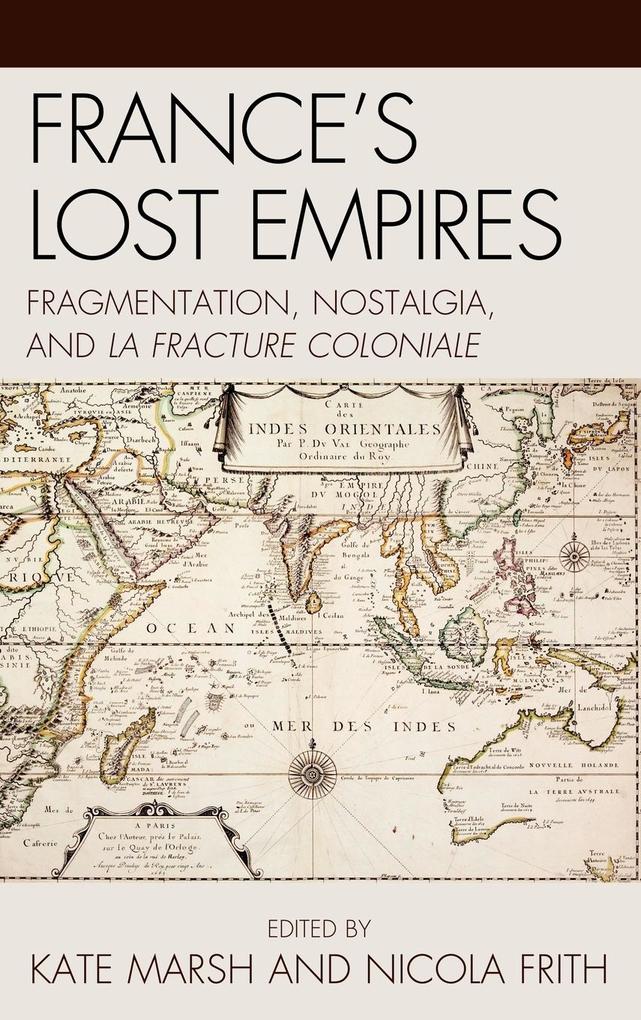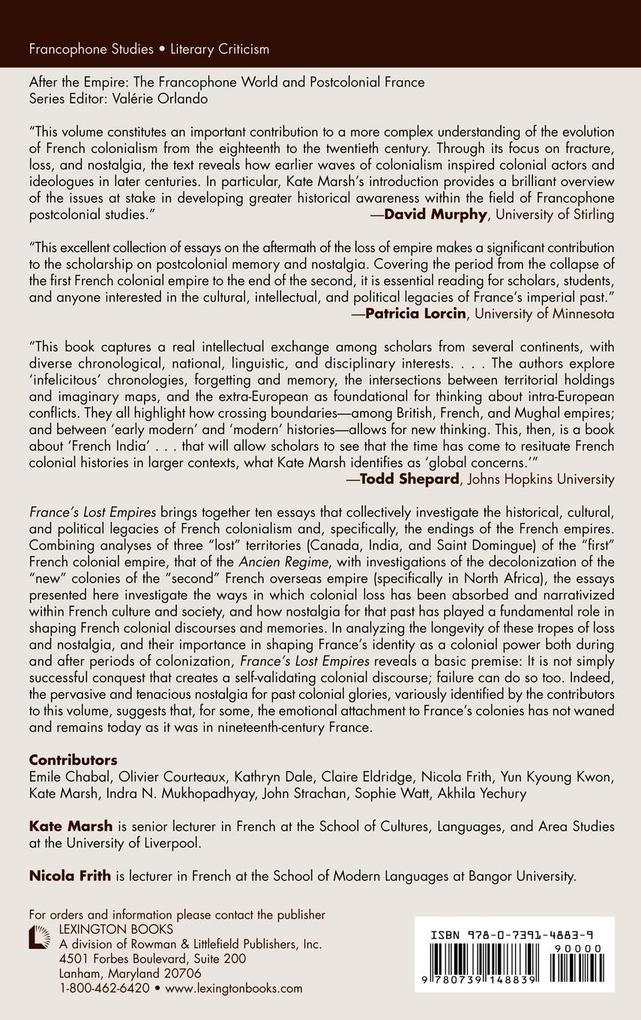
Zustellung: Mo, 25.08. - Do, 28.08.
Versand in 7 Tagen
VersandkostenfreiBestellen & in Filiale abholen:
This collection of essays investigates the fundamental role that the loss of colonial territories at the end of the Ancient Regime and post-World War II has played in shaping French memories and colonial discourses. In identifying loss and nostalgia as key tropes in cultural representations, these essays call for a re-evaluation of French colonialism as a discourse informed not just by narratives of conquest, but equally by its histories of defeat.
Inhaltsverzeichnis
Chapter 1 Introduction: Territorial Loss and the Construction of French Colonial Identities: 1763-192 Part 2 Part I: Nostalgic Reflections on France's First Overseas Empire Chapter 3 Chapter 1: "Remember Saint Dominque": Accounts of the Haitian Revolution by Refugee Planters in Paris and Colonial Debates under the Restoration: 1814-25 Chapter 4 Chapter 2: A Celebration of Empire: Nostalgic Representations ofl'Inde francaise in Chocolat Suchard's Colonial Collecting Cards of the 1930s Chapter 5 Chapter 3: De Gaulle and the "Debt of Louis XV": How Nostalgia Shaped de Gaulle's North American Foreign Policy in the 1960s Part 6 Part II: Narratives of Loss: Decolonization Under the Fourth and Fifth Republics Chapter 7 Chapter 4: Between History, Memory, and Mythology: The Algerian Education of Albert Camus Chapter 8 Chapter 5: Alexandre Arcady and the Rewriting of French Colonial History in Algeria Part 9 Part III: L'Inde perdue: France and Colonial Loss Chapter 10 Chapter 6: Compensating forl'Inde perdue: Narrating a "Special Relationship" Between France and India in Romanticized Tales of the Indian Uprisings (1857-58) Chapter 11 Chapter 7:L'Inde retrouvee: Loss and Sovereignty in French Calicut, 1867-1868 Chapter 12 Chapter 8: Alexandra Dumas's and Jules Verne's India: The French Republic of Letters Discusses Imperial Historiography Part 13 Part IV: Memories of French Colonialism in the Late-Twentieth and Early-Twenty-First Centuries Chapter 14 Chapter 9: "Le symbole de l'Afrique perdue": Carnoux-en-Provence and the pied-noir Community Chapter 15 Chapter 10: La Republique Postcoloniale? Making the Nation in Late-Twentieth-Century France
Mehr aus dieser Reihe
Produktdetails
Erscheinungsdatum
28. Dezember 2010
Sprache
englisch
Untertitel
Fragmentation, Nostalgia, and la fracture coloniale.
Sprache: Englisch.
Seitenanzahl
184
Reihe
After the Empire: The Francophone World and Postcolonial France
Herausgegeben von
Nicola Frith, Kate Marsh
Verlag/Hersteller
Produktart
gebunden
Gewicht
426 g
Größe (L/B/H)
235/157/15 mm
ISBN
9780739148839
Entdecken Sie mehr
Pressestimmen
This excellent collection of essays on the aftermath of the loss of Empire makes a significant contribution to the scholarship on post-colonial memory and nostalgia. Covering the period from the collapse of the first French colonial empire to the end of the second, it is essential reading for scholars, students and anyone interested in the cultural, intellectual and political legacies of France's imperial past. -- Patricia Lorcin, University of Minnesota This volume constitutes an important contribution to a more complex understanding of the evolution of French colonialism from the 18th to the 20th century. Through its focus on fracture, loss and nostalgia, the text reveals how earlier waves of colonialism inspired colonial actors and ideologues in later centuries. In particular, Kate Marsh's introduction provides a brilliant overview of the issues at stake in developing greater historical awareness within the field of Francophone postcolonial studies. -- David Murphy, University of Stirling, University of Stirling This book captures a real intellectual exchange between scholars from several continents, with diverse chronological, national, linguistic, and disciplinary interests. The articles engage with each other and thus make visible how thinking with "Lost India" crystallizes certain common themes and upends some problematic commonplaces in postcolonial studies. The authors explore "infelicitous" chronologies; forgetting and memory; the intersections between territorial holdings and imaginary maps; and the extra-European as foundational for thinking intra-European conflicts. They all highlight how crossing boundaries-between British, French, and Mughal empires; "early modern" and "modern" histories-allows for new thinking. This, then, is a book about "French India"-where actual colonialism always references lost hopes and persistent yet out of reach possibilities-that will allow scholars to see that the time has come to resituate French colonial histories in larger contexts, what Kate Marsh identifies as "global concerns." -- Todd Shepard, Johns Hopkins University Those interested in particular areas of the French empire, or the general phenomenon of the place of colonialism in French society and culture, will find valuable essays here to attract them. H-France This original contribution to postcolonial studies offers several articles that will be of interest to specialists and generalists alike. Oxford Journals
Bewertungen
0 Bewertungen
Es wurden noch keine Bewertungen abgegeben. Schreiben Sie die erste Bewertung zu "France's Lost Empires" und helfen Sie damit anderen bei der Kaufentscheidung.





























